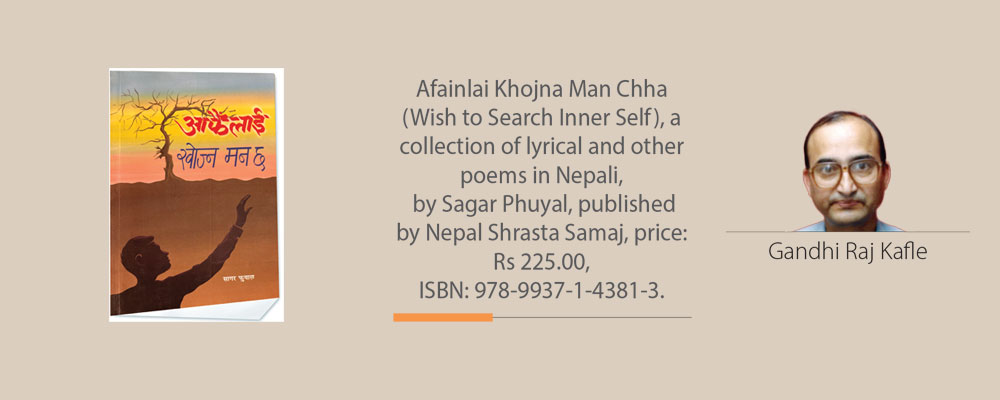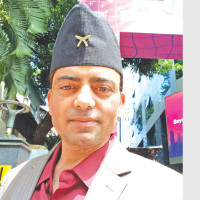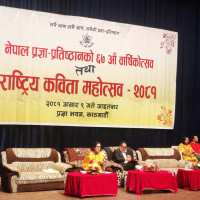- Wednesday, 26 June 2024
A poetic Quest To Define Pure Love
The outcome of self-search can be impressive art if poets or authors find meaningful words to define it. Here we have the under-reviewed collection of poems entitled “Afainlaai Khojna Man Chha” by Sagar Phuyal, which has come out with writings in a self-introspective mood.
What has the poet intended to serve readers in this mood? No doubt, the chance to catch some philosophical tone while engrossed in delivering poetical expressions in such a mood naturally becomes high in this condition. But the poet has not gone so far, which means he is back to the tone of the poetic line and expressions both in poems and songs in this anthology.
Phuyal’s collection is divided into two parts—the first part of poems and the second part of songs—and forty-forty of both make it an anthology of 80 poems. So far as the poet’s passion is concerned, he is eager to contribute to both the lyric and poetry genres of Nepali literature, and this book is proof of that.
In his poems, he has tried his best to reach deep to find messages in subjects that matter—life and sentiments. The common themes in it are nature, love, true goodwill, the pain of going abroad, awareness, the need to search for the inner self, human life, struggle, illusions, friendship, etc. In these and other poems, the poet is sentimentally empowered to express something deep to fulfil the aim of his self-discovery.
One example of this sentiment is in the poem “Efforts need to be continued," page 15, where he says true love is an indomitable spirit. So, in the concluding lines of this poem, he aptly reminds a Nepali faith that ‘even the stone melts’ to highlight the importance of trust and struggle in life.
Poet Phuyal’s poetic self-search is logically broad. He humbly accepts the rule of nature and picks examples of the sun and the moon to console his inner self and gain strength to fight bitter reality and hindrances to love. The poem “Sun and Moon Need to Disappear” explains the eccentric rule of love. The last four lines of this poem, page 92, are like this: ‘Here the sun needs to be set, even to view the moon. Here the moon must vanish, to enjoy the warmth of the sunlight’.
In the part song, the poet tries his best to find words for rhythmic expressions, the art that he has lovingly chosen even in the past. Here, he accords top priority to coming into singing form, and for it, he is keen to be short and sweet in his expressions.
There are a few examples of such efforts on the part of the lyricist, too. The four lines on page 113 are worthy of quoting here: ‘Chadhhdai Jaanda Devithana Pugyaun Bhane/Tyahi Sindhur Ani Pote Pani Garnuprchha/Harek Juni Sangasangai Banchne Kasam Khanuparchha/Hamro Maya Phulko Rupa Jastai Hunuparchha.
In these lines of song, the poet ascends to a height of purity with rhythmic words. With the words Devithan (abode of the mother goddess), Sindurpote (two decorative ornaments for marrying women), Kasam (promise or vow), and Phulko Rupa (like the innocence and beauty of a flower), the poet seeks all the purity to sing the song of love.
Critics say metaphoric expression is the art that makes poems and songs beautiful. Poet Sagar Phuyal seems to be sincere about this creative value. The latest proof from him is the under-reviewed anthology “Aafailai Khojna Man Chha” itself.
We can find such symbols in poems like “Khoja Aafailaai'' (Discover Yourself), Bisha Kamal (Poisonous Lotus), Ma, Aek Adbhut Manchhe (I am an Extraordinary Person). On the lyrics side, too, the author is anxiously creative to find suitable words or symbols for rhythmic expressions.
On page 107, the first two lines of the song favour the pride of Nepal and wish to seek even the help of the mountain Sagarmatha to be inspired to make the hearts and shoulders of all citizens stronger. There is a song in the 112-page album entitled ‘To Flow Down Stream’, where the lyricist produces a very serious message in simple words.
Love carries a great meaning, and its attraction is forceful and motivational. But it is not as simple as some assume and understand: it demands sacrifice and sometimes even motivates to walk from heart to soul. This is, in fact, the reason why poets all over the world are trying their best to bring out sweet and deep meanings in their poems and songs.
This anthology and his earlier poetic work, ‘Anjulima Thapna Paye', are proof of the consistent interest of Phuyal in carrying up hobbies to compose poems and songs simultaneously.
(Kafle is a former Deputy Executive Editor of this daily.)
















